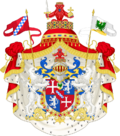Monarchy of Sydalon: Difference between revisions
mNo edit summary |
|||
| (4 intermediate revisions by the same user not shown) | |||
| Line 10: | Line 10: | ||
| image = Melisende III, 2018.jpg | | image = Melisende III, 2018.jpg | ||
| incumbent = [[Melisende III of Sydalon|Melisende III]] | | incumbent = [[Melisende III of Sydalon|Melisende III]] | ||
| incumbentsince = | | incumbentsince = 22 May 2013 | ||
| heir_apparent = [[Hugh, Prince of Petra]] | | heir_apparent = [[Hugh, Prince of Petra]] | ||
| his/her = Her | | his/her = Her | ||
| Line 18: | Line 18: | ||
| residence = ''[[#Residences|See list]]'' | | residence = ''[[#Residences|See list]]'' | ||
}} | }} | ||
The '''Monarchy of Sydalon''', or the '''Sydalene Monarchy''' is the monarch, head of state and government of [[Sydalon]]. The title of the Monarch is either <nowiki>"King" or "Queen"</nowiki> depending on the gender of the reigning Monarch. There were 26 kings and 10 queens in total | The '''Monarchy of Sydalon''', or the '''Sydalene Monarchy''' is the monarch, head of state and government of [[Sydalon]]. The title of the Monarch is either <nowiki>"King" or "Queen"</nowiki> depending on the gender of the reigning Monarch. There were 26 kings and 10 queens in total. The current monarch is [[Melisende III of Sydalon|Queen Melisende III]]. | ||
The Monarchy was formed following the [[Crusades (Ajax)#First Scipian Crusade|First Crusade]] in 1237 and the creation of the [[Sydalon|Kingdom of Sydalon]] when crusader [[Jordan I of Sydalon|Jordan of Garza]] was crowned king by [[Pope (Ajax)|Pope Leo III]]. The Monarch was the nominal [[wikipedia:Homage (feudal)|liege lord]] of all crusader states formed following the First Crusade, and occasionally new crusader states formed in subsequent crusades. | The Monarchy was formed following the [[Crusades (Ajax)#First Scipian Crusade|First Crusade]] in 1237 and the creation of the [[Sydalon|Kingdom of Sydalon]] when crusader [[Jordan I of Sydalon|Jordan of Garza]] was crowned king by [[Pope (Ajax)|Pope Leo III]]. The Monarch was the nominal [[wikipedia:Homage (feudal)|liege lord]] of all crusader states formed following the First Crusade, and occasionally new crusader states formed in subsequent crusades. | ||
| Line 29: | Line 29: | ||
==Succession== | ==Succession== | ||
{{main|Line of succession to the Sydalene throne}} | {{main|Line of succession to the Sydalene throne}} | ||
Succession to the Sydalene throne is governed by the principles of [[wikipedia:Primogeniture#Absolute primogeniture|absolute primogeniture]], whereby the eldest legitimate child of the monarch inherits the throne. This succession law was first instituted during a [[Great Council (Sydalon)#1639|great council]] called by King [[Rainier II of Sydalon|Rainier II]] in 1639. Rainier's only son [[Jordan VI of Sydalon|Jordan]] was of poor health, and Rainier's daughter was married to the future Latin Emperor [[Constantine XVII Aemelius]]. The Great Council was called due to the precarious position of the royal succession, and to prevent a perpetual union with Latium. | |||
Prior to the 1639 Great Council, royal succession in Sydalon followed male-preference primogeniture. While there have been efforts to revert succession laws to pre-1639 laws, all have thus far failed. | |||
In addition to the birth order requirements, one must profess the [[Fabrian Catholic Church|Fabrian Catholic]] faith to be eligible to succeed to the throne. | |||
==Titles, Styles, and honors== | ==Titles, Styles, and honors== | ||
Numerous titles have been accumulated by the Monarch due to inheritance, repeal of titles by rebellious vassals or lords, or simply due to confiscation. The full title and style of the reigning Monarch of Sydalon is: | Numerous titles have been accumulated by the Monarch due to inheritance, repeal of titles by rebellious vassals or lords, or simply due to confiscation. The full title and style of the reigning Monarch of Sydalon is: | ||
:''By the Grace of God, Most Christian Queen of Sydalon, Queen of Yerushalayim | :''By the Grace of God, Most Christian Queen of Sydalon, Queen of Yerushalayim, Princess of Ostracine and the the lands adjacent, Princess of Garza, and of Audonia, Duchess of Rabuelia, Countess of Elysia, of Belveer, of Cincari, of Seressi, of Saona, and of Auzegera, and Countess of Caymont, Countess of Amala, Custodian and Protector of the Holy Land, Advocate and Guarantor of the Most Holy City of Sydalon, and of Sarpeta, Defender of the Church of the Holy Sepulchre, Patron of the Order of Knights of the Sacred Chalice, and of the Supreme Order of the Holy Sepulchre and Brotherhood of Saint Joseph, Guardian of the Gateway to Scipia, Protector of Pilgrims, and Mother of the Nation''. | ||
In most instances, a simplified version of the Royal title is utilized; in the case of [[Melisende III of Sydalon|Queen Melisende III]], she is most often referred to as simply <nowiki>"The Queen".</nowiki> | In most instances, a simplified version of the Royal title is utilized; in the case of [[Melisende III of Sydalon|Queen Melisende III]], she is most often referred to as simply <nowiki>"The Queen".</nowiki> | ||
Latest revision as of 17:00, 7 July 2024
| Queen of Sydalon | |
|---|---|
| Reina di Sydalon | |
 | |
| Incumbent | |
 | |
| Melisende III since 22 May 2013 | |
| Details | |
| Style | Her Majesty |
| Heir apparent | Hugh, Prince of Petra |
| First monarch | Jordan I |
| Formation | 19 June 1237 |
| Residence | See list |
The Monarchy of Sydalon, or the Sydalene Monarchy is the monarch, head of state and government of Sydalon. The title of the Monarch is either "King" or "Queen" depending on the gender of the reigning Monarch. There were 26 kings and 10 queens in total. The current monarch is Queen Melisende III.
The Monarchy was formed following the First Crusade in 1237 and the creation of the Kingdom of Sydalon when crusader Jordan of Garza was crowned king by Pope Leo III. The Monarch was the nominal liege lord of all crusader states formed following the First Crusade, and occasionally new crusader states formed in subsequent crusades.
House law, controlled by Royal Decree, dictates succession to the Sydalene throne. If the Monarch is unmarried or has no children, the Royal Family typically consists of the heir presumptive and siblings of the Monarch. Succession to the Sydalene Crown relies on the succession laws, which have been based in gender-neutral primogeniture since 1529.
Powers and abilities
The Monarch exercises executive power through Royal Decrees issued directly by the Monarch or through the Haut Cour, and the Council of Ministers. The Monarch has exclusive authority to appoint Ministers, and the Chancellor, who comprise the Council of Ministers. While the National Assembly has the ability to draft and pass legislation, most often legislation originates from the Haut Cour or the Council of Ministers. The Monarch is required to sign passed legislation before it can be enacted as law; however, the Monarch may refuse to sign and withhold Royal Assent.
Judicial power is invested in the Monarch, who delegates tasks to a professional, permanent, and semi-independent judiciary. The Monarch appoints judges to all royal courts, and courts in the Royal Domain. Judges serve at the Monarch's pleasure, which in theory, and often times in practice, can lead to unexpected turnover at high-level courts, including the Court of the Queen's Bench.
Succession
Succession to the Sydalene throne is governed by the principles of absolute primogeniture, whereby the eldest legitimate child of the monarch inherits the throne. This succession law was first instituted during a great council called by King Rainier II in 1639. Rainier's only son Jordan was of poor health, and Rainier's daughter was married to the future Latin Emperor Constantine XVII Aemelius. The Great Council was called due to the precarious position of the royal succession, and to prevent a perpetual union with Latium.
Prior to the 1639 Great Council, royal succession in Sydalon followed male-preference primogeniture. While there have been efforts to revert succession laws to pre-1639 laws, all have thus far failed.
In addition to the birth order requirements, one must profess the Fabrian Catholic faith to be eligible to succeed to the throne.
Titles, Styles, and honors
Numerous titles have been accumulated by the Monarch due to inheritance, repeal of titles by rebellious vassals or lords, or simply due to confiscation. The full title and style of the reigning Monarch of Sydalon is:
- By the Grace of God, Most Christian Queen of Sydalon, Queen of Yerushalayim, Princess of Ostracine and the the lands adjacent, Princess of Garza, and of Audonia, Duchess of Rabuelia, Countess of Elysia, of Belveer, of Cincari, of Seressi, of Saona, and of Auzegera, and Countess of Caymont, Countess of Amala, Custodian and Protector of the Holy Land, Advocate and Guarantor of the Most Holy City of Sydalon, and of Sarpeta, Defender of the Church of the Holy Sepulchre, Patron of the Order of Knights of the Sacred Chalice, and of the Supreme Order of the Holy Sepulchre and Brotherhood of Saint Joseph, Guardian of the Gateway to Scipia, Protector of Pilgrims, and Mother of the Nation.
In most instances, a simplified version of the Royal title is utilized; in the case of Queen Melisende III, she is most often referred to as simply "The Queen".
Residences
The Monarch's official residence in Ostracine is Palis de Aultavilla. It is the site of most state banquets, investitures, royal christenings and other ceremonies. The Sovereign's official residence in Sydalon is Castra Rubea.
Palis de Aultavilla, in Ostracine, is the primary royal residence.
Castra Rubea, in Sydalon, is the official royal residence.
Palis Royal is the official residence of the Prince of Petra, in Ostracine.
Ajklabejta is the seat of the Monarch in Petra.



